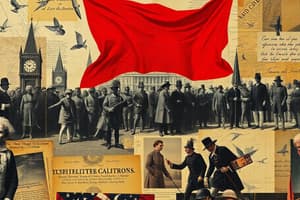Podcast
Questions and Answers
How did the structure of the Three Estates contribute to the French Revolution?
How did the structure of the Three Estates contribute to the French Revolution?
- By ensuring that the nobility and clergy fairly represented the commoners' interests.
- By creating social and economic inequalities that fueled resentment among the Third Estate. (correct)
- By promoting political stability and preventing social unrest.
- By equally distributing wealth and power among all citizens.
Why was the execution of King Louis XVI a significant event in the French Revolution?
Why was the execution of King Louis XVI a significant event in the French Revolution?
- It led to a peaceful resolution of the conflict between the monarchy and the revolutionaries.
- It solidified the king's power and suppressed revolutionary movements.
- It had no impact on the course of the French Revolution.
- It demonstrated the revolutionaries' commitment to abolishing the monarchy and establishing a republic. (correct)
Which of the following best describes the Reign of Terror and its impact on the French Revolution?
Which of the following best describes the Reign of Terror and its impact on the French Revolution?
- A violent period of repression and execution of perceived enemies of the revolution, led by the Jacobins. (correct)
- A period of economic growth and social reform that addressed the grievances of the Third Estate.
- A period of reconciliation between the monarchy and the revolutionaries.
- A period of peace and prosperity that stabilized the revolutionary government.
How did the French Revolution influence other parts of the world?
How did the French Revolution influence other parts of the world?
What role did taxation play in causing the French Revolution?
What role did taxation play in causing the French Revolution?
What was the significance of the Estates General being convened in 1789?
What was the significance of the Estates General being convened in 1789?
Which of the following reflects how living conditions influenced the revolution?
Which of the following reflects how living conditions influenced the revolution?
What long-term impact did the French Revolution have on France?
What long-term impact did the French Revolution have on France?
Flashcards
Three Estates
Three Estates
The division of French society into clergy, nobility, and commoners.
Taille
Taille
A land tax that burdened the common people in France.
Estates General
Estates General
A representative assembly of the three estates convened in 1789.
Reign of Terror
Reign of Terror
Signup and view all the flashcards
Execution of King Louis XVI
Execution of King Louis XVI
Signup and view all the flashcards
Social Inequality
Social Inequality
Signup and view all the flashcards
Consequences of the Revolution
Consequences of the Revolution
Signup and view all the flashcards
Political and Social Changes
Political and Social Changes
Signup and view all the flashcards
Study Notes
The French Revolution: Causes, Events, and Consequences
- The French Revolution was a period of significant political and social change in France, marked by challenges to the existing order.
- French society was divided into three estates:
- The First Estate (Clergy)
- The Second Estate (Nobility)
- The Third Estate (Peasants and commoners)
- The Third Estate faced heavy taxation (e.g., the Taille).
- Inequality and financial burdens on the common people fueled discontent.
- The Estates General, a representative body comprising delegates from each estate, was convened in 1789 to address the economic crisis in France.
- Causes of the Revolution included poor harvests, rising bread prices, and demands for social change and equality by the Third Estate.
- The execution of King Louis XVI in 1793 marked a turning point in the revolution.
- The Reign of Terror was a period characterized by violent suppression of opposition following the radical actions of the Jacobins.
- The revolution led to the establishment of a new order in France, including the abolition of the monarchy and the adoption of principles of liberty, equality, and fraternity.
- The revolution had far-reaching consequences that influenced political and social changes across the world.
Studying That Suits You
Use AI to generate personalized quizzes and flashcards to suit your learning preferences.
Related Documents
Description
Explore the French Revolution, a period of political and social upheaval in France. Examine the causes, including social inequality and economic hardship. Key events include the execution of Louis XVI and the Reign of Terror. Understand the long-term consequences of this transformative period.




